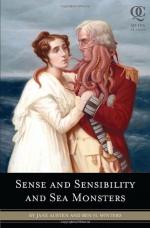|
|
Sense and Sensibility Author/Context
Jane Austen was born in Steventon, England, in 1775, the seventh of eight children. Her father, the Rev. George Austen, her mother Cassandra, and their six boys and two girls lived modestly at the rectory. At the periphery of the upper class, her father farmed and taught to supplement their income. Her father was a classics scholar, and all the children were schooled at home, boys by dad, and the girls by mom. Austen also spent several years studying at a school away from home. Her childhood was from all accounts happy; her family often read aloud to each other and performed plays. They encouraged her talent and intellect, and Austen began writing during her teenage years to entertain her younger brother.
Bath, the area of England most associated with Jane Austen, was home for only four years, from 1801 to 1805. The family moved there when her father retired, and moved to Southampton in 1805 after her father's death. She lived in Southampton until 1809, when she moved into a house her brother had obtained for her and her family in Chawston. The period during Austen's residence in Bath and Southampton was a stark one from a literary perspective-- Austen wrote little during this time. Travel and tedious social engagements kept her busy in Bath; in Southampton she was troubled by city life and a noisy infant recently added to the household.
Likely because marriage figures so prominently in her novels, much has been made of Austen's decision not to marry. Though there exists little evidence to support any romances, as many of her more intimate letters were destroyed, there is much speculation on the topic. Being unmarried in one's twenties qualified one as a spinster, but Austen accepted and then quickly rejected a proposal made to her at the age of twenty-seven. There is also rumor of a love in her childhood whom she was unable to marry due to her small fortune, and a somber tale of a mystery man who died soon after Austen fell in love with him. Dedicated to her writing and protective of her privacy, there is no record of her complaining about her single life.
Austen worked hard on her novels, constantly revising them. She wrote her first work, a satire, at the age of 15. Sense and Sensibility, Pride and Prejudice, and Northanger Abbey were all begun in the 1790s and revised greatly before their publication, with Sense and Sensibility not published until 1811. Early in her career, Austen used the epistolary form for her writing, and the first draft of Sense and Sensibility, then entitled Elinor and Marianne, was a novel composed of letters. Her three later novels, Mansfield Park, Emma, and Persuasion, were all written later in life. Of all her works, only Emma was written with relative speed. Publishing her novels was important to Austen, though nearly all were published long after they were written; Northanger Abbey and Persuasion being published posthumously. Her desire to publish anonymously was not unusual; for a woman writer, fame could often lead to infamy. It was not until after her death, in 1818, that a biographical note was added to her novels and her authorship was established.
The novelist Virginia Woolf said of Jane Austen: "Of all the great writers she is the most difficult to catch in the act of greatness." The deftness of Austen's prose and observations have often been mistaken as signs of a lack of professionalism and labor, rather that her success as a novelist. A keen observer of social class and customs, Austen has been criticized for the realism in her novels, especially discussions of economic matters. Yet Austen also has many admirers. Immortalized in a Rudyard Kipling story called "The Janeites," this secret group is described as strong admirers of the novelist, who find her characters as relevant and real today as in the 1800s. Not having received much acclaim by the time she died of Addison's disease in 1817, Austen is today the respected and well-read author she desired to become.
Bibliography
Austen, Jane. Sense and Sensibility. New York: Penguin Books, 1995.
Fergus, Jan. Jane Austen: A Literary Life. New York: St. Martin's Press, 1991.
Joyce, Elizabeth. "Jane Austen." British Women Writers: A Critical Reference Guide. Ed. by Janet Todd. New York: Continuum, 1989.
Southan, Brian. "Jane Austen." British Writers. Vol. 4., ed. by Ian Scott-Kilvert. New York: Charles Scribner's Sons, 1981.
Stapleton, Michael, ed. Cambridge Guide to English Literature. Cambridge: Cambridge University Press, 1983.




